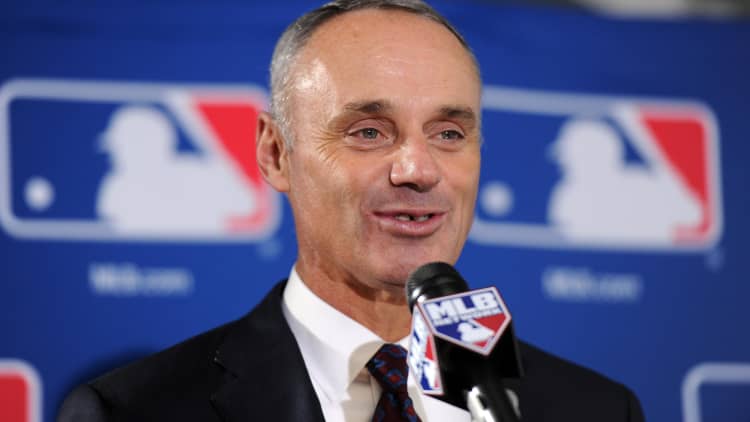



On Tuesday, Cincinnati will host baseball's 86th All-Star Game. At the mid-point of the 2015 season, baseball is financially strong, but what does the future hold for America's pastime?
Last year, Major League Baseball took in $9 billion in revenue. According to Forbes, that's an all-time high; meanwhile, the average value of the 30 MLB teams is $1.2 billion.
But in an interview with CNBC's "On The Money," Washington Post Senior Editor Marc Fisher pointed out that the "grand old game" may have a demographic problem.
Fisher says the average baseball fan and TV viewer is over 55 years old. "That's a problem baseball needs to address or it won't have that much of a future," Fisher warned.
In short, baseball watchers are older than their counterparts. The median age of a baseball viewer is 53 years old, according to ESPN, compared to 47 in the National Football League. Separtately, the National Basketball Association's median fan age is just 37. Even more troubling, says Fisher, is that baseball is failing to connect with younger fans and bring in a new generation.
Since the game is often considered to have less action than other sports, it is "out of step with today's society," he said.
Fisher adds: "There is a problem with kids thinking that baseball is a sport where nothing happens, where they stand in the outfield waiting for a long time."
That's if they are playing the game: Baseball participation is the lowest among the four major team sports, recent figures suggest.
Read MoreHoly Cow! Yankees salaries equal 2.5% of all Bronx wages
Baseball's missing 'cool factor'
According to data from Statista, 13.3 million U.S. kids played baseball in 2013, while basketball ranked first with 23.7 million kids (age 6 and above) playing. That's followed by football, with nearly 19 million, and soccer with 17.5 million.
So why aren't more kids playing baseball and becoming fans?
"Baseball is not as 'cool' as it used to be," says Ken Shropshire, a sports lawyer and a professor at the University of Pennsylvania's Wharton School of Business. Shopshire points to baseball's lack of big name stars in contributing to what he calls, "that difficult to measure 'cool factor.' "
Citing baseball and basketball's marquee names, Shropshire asked: "Who is the LeBron (James) of baseball? "Who is the Tom Brady? It's more difficult for kids to say 'they want to be like somebody.' "
Shropshire, who is author of "Sports Matters: Leadership, Power and the Quest for Respect in Sports," takes a different view of baseball's future. He believes baseball is in a "transition period" now that may give way to the sport's bringing younger fans into the fold.
"This is where I tend to differ a little bit on what people are thinking," Shropshire said. "I think baseball is really going to capture the youth audience with the use of technology … that other sports have not captured in the same way."
Shorpshire points to MLB.com's AtBat mobile application, which according to comScore was the top U.S. sports app in April, based on time usage.
"The way [baseball] is presented to us is the 'old style' transitioning into what's new.' Shropshire says, even as he acknowledged the game is steeped in history and nostalgia. "Certainly the sport is more designed for radio than TV, but I think these apps [are] something that's going to make a difference in how the sport is received.
Shropshire says one of MLB Commissioner Rob Manfred's priorities is "this youth initiative that's broad-based," because "in any business you've got to think of your future markets." But he also tells CNBC the league "needs more diversity within the organization" at the top echelon.
"In the long run, baseball's gonna be with us. Baseball is not going to become extinct in any kind of way," he said. However, "it could be different if it doesn't address these issues."
—"On the Money" airs on CNBC Sundays at 7:30 p.m., or check listings for air times in local markets.



